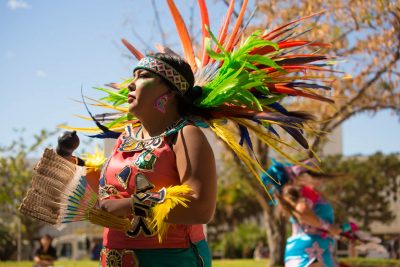
The 125th Boston Marathon, postponed from its typical date on Patriots Day, was moved to the same Monday as Indigenous Peoples’ Day, prompting concerns from Indigenous advocates on the overshadowing of the holiday.
Though the second Monday of October was previously recognized by other cities and states as Indigenous Peoples’ Day to celebrate Indigenous communities, Acting Mayor Kim Janey recognized the holiday in Boston via an Oct. 6 executive order, making Oct. 11 the first Indigenous Peoples’ Day officially observed by the City.
The order came after the Boston Athletic Association rescheduled due to COVID-19 in a January announcement.
Jean-Luc Pierite, a member of the Tunica-Biloxi Tribe of Louisiana and president of the North American Indian Center of Boston, said the executive order affirms Indigenous sovereignty and acknowledges colonial violence’s specific impact over the past centuries.
“It’s not just the holiday, it’s not just about taking down Columbus Day,” he said. “But it is an affirmation of sovereignty and it lays out several action steps as well for Indigenous community members to better relationships.”
Some Indigenous Bostonians, however, said the Boston Marathon overshadowed efforts to draw attention to colonialism.
Executive director of Wings for America — a nonprofit that supports young Native runners — and Navajo Nation member Dustin Martin said he initially believed running the marathon on Indigenous Peoples’ Day was a chance to honor the legacy of past Native champions.
“But the more that I learned about the way that the Boston Marathon initially kind of dismissed the criticisms of the Indigenous community in the Boston area, I realized that they were not very sensitive or really graceful in the way that they recognized the holiday,” he said.
Pierite said NAICOB, United American Indians of New England and various town committees set forth demands for the BAA to address their rescheduling in the spring of 2021, but Pierite added that how the BAA scheduled the marathon was “harmful” and “done with very little consultation.”
The BAA expressed their apologies in an August press release to those “who have felt unheard or feared the importance of Indigenous Peoples’ Day would be erased” and said in selecting the date the Association “in no way wanted to take away” from the holiday.
They did not respond to email and phone requests for comment on this article in time for publication.
The BAA also donated to the Indigenous Peoples’ Day Newton Committee to help fund their first-ever celebration, according to the release. Additionally, before the start of the race, an acknowledgment ceremony of the course’s path through Native land took place.
Robert Peters, a Mashpee Wampanoag artist, painted a BAA-commissioned mural highlighting Indigenous history in the Boston Marathon in the land acknowledgment ceremony.
Five Indigenous runners were included on that mural canvas, including Ellison “Tarzan” Brown, Patti Catalano Dillon, Tom Longboat, Andrew Sockalexis and Jordan Marie Daniel.
“I insisted that I wanted to paint ‘Tarzan’ Brown,” Peters said. “He was the only one that was painted and the other ones were cutouts that were glued over the work.”
Martin said early conversations with a BAA representative, who said the organization was considering doing more to celebrate Indigenous Peoples’ Day, provided the opportunity to recognize the history of champion “Tarzan” Brown specifically — a member of the Narragansett tribe who won the 1936 and 1939 marathons.
“It’s always frustrated me that there is no monument to Tarzan Brown on Heartbreak Hill and Newton,” Martin said, noting Brown’s victory over Johnny Kelly in the 1936 race. “There are actually two statues of Johnny Kelley in that section of the course, but no mention permanently of Tarzan Brown, the person who really gave that area of the course its famous name.”
For Peters, land acknowledgment in a ceremony isn’t enough. He said giving Indigenous populations more sovereignty would truly be a recognition of Native history.
“If they really wanted to acknowledge the land, they would give it back,” he said. “They would give us back land and give us back control over things that we had.”
Pierite said he also wanted to caution that changes the BAA made should not act as a “one-and-done” situation.
“I’d like to see a land acknowledgment at every Boston Marathon because the Boston Marathon is still running through Indigenous territories,” he said. “It starts in Hopkinton, in the territory of Nipmuc, and it ends in Boston, in the territory of the Massachusett. It’s something that should be ongoing.”

















































































































